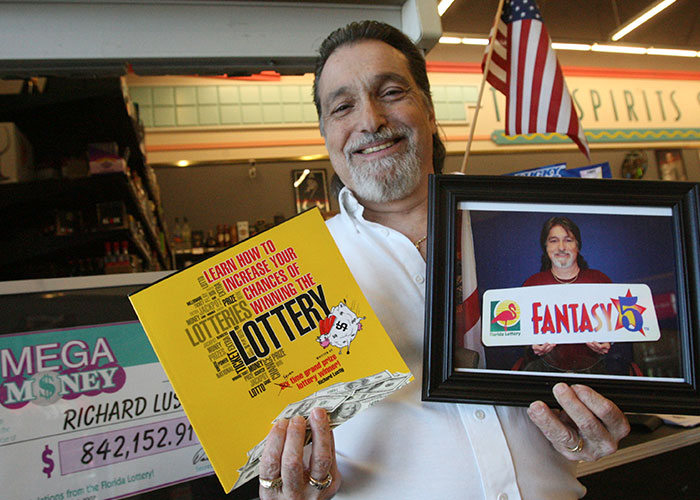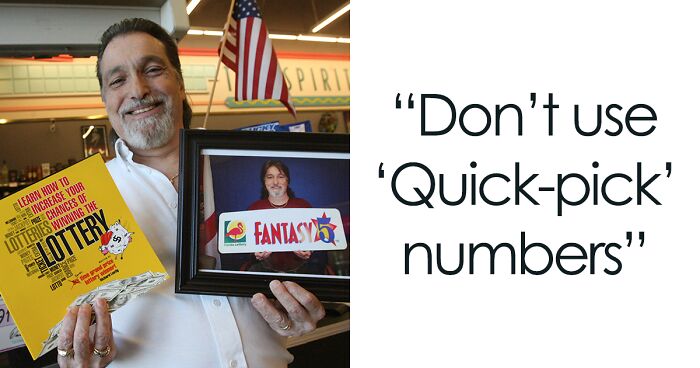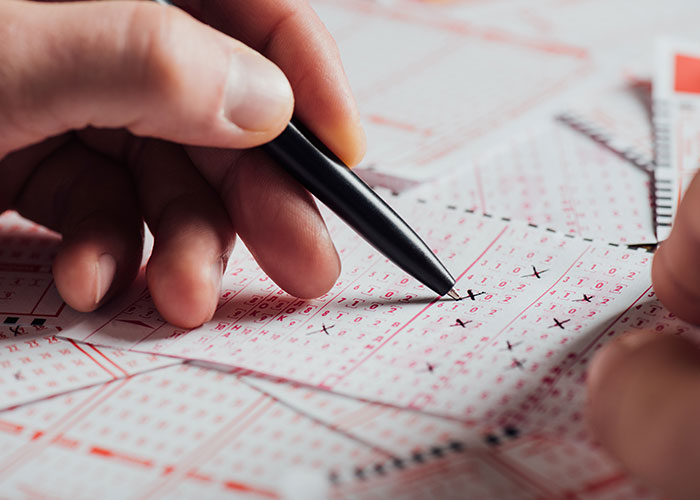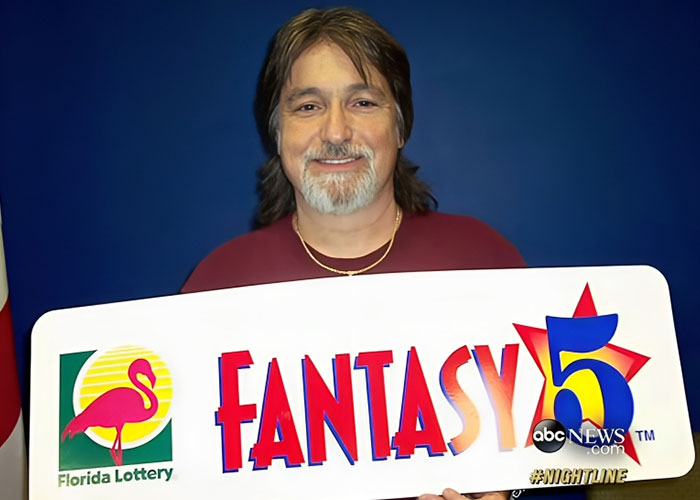We’ve all dreamt of winning the lottery at least once in our lives. From buying a house to traveling with loved ones or paying student loans, everyone has a different fantasy about how they’d spend the big prize.
Richard Lustig was able to make this dream come true not once but seven times.
The man, born in Orlando, Florida, bagged the large sum of $1,052,205 after winning seven state-sponsored lottery games between 1993 and 2010.
His biggest prize was a $842,152.91 jackpot he banked in 2002.
Before he passed away in 2018, Lustig revealed his tips and tricks to help people increase their chances of winning the lottery.
Richard Lustig banked the large sum of $1,052,205 after winning seven state-sponsored lottery games between 1993 and 2010

Image credits: gettyimages
At the beginning, he revealed to Forbes in 2016, the odds weren’t in his favor.
“When the lottery came to Florida, I was like everybody else: ‘Wow, buy lottery tickets, win a lot of money, retire, buy a big fancy yacht, whatever, blah, blah, blah,’” he said.
“Like everybody else, I was running out and buying haphazardly, buying quick picks, I mean buying tickets with no plan, or no method, or whatever. Like everybody else, I was losing all the time.”
After all the trial and error, he was able to perfect a strategy and arrive at a lucky formula. Every time he won, he’d always write down the methods that proved successful to implement them with the next ticket.
It’s important to note that these tips don’t follow strict mathematical logic but are based on Lustig’s experience.
The first strategy suggested by the author of Learn How To Increase Your Chances of Winning the Lottery is to avoid quick-pick numbers generated by the store’s computers.
In an interview with Forbes, he revealed several tips to help lottery players increase their chances of winning
Image credits: LightFieldStudios
“Every time you buy a quick pick, you get a different set of numbers; therefore, your odds are always going to be at their worst in that particular game,” he said.
Furthermore, he explained why a popular strategy, using birthdays and anniversaries, isn’t recommended. Here, the key point is the spread. If you limit yourself to numbers between 1 and 31, you’re using less than half of the numbers available.
Plus, as this method is fairly common, you’ll be sharing the prize with other winners.
“If you pick your own numbers and only play birthdays and anniversaries, you’re splitting the pot with 20-40 people,” the seven-time winner explained.
“If you spread the numbers out across the whole track, you’ll either be the only winner or will split it with only one or two people.”
Richard’s formula: avoid quick-pick numbers, play consistently (but always set a budget limit), go beyond birthdays, and stick to your numbers
Image credits: Fox Business
The third piece of advice he gave was to stick to your “good” numbers and play them every time. Then, if you buy more than one card, he suggested using a different set of numbers.
“Remember, a set of numbers wins the grand prize, not individual numbers,” he added.
If you want to increase your odds, you should also play consistently. “Never miss a drawing in the game you’re playing. Every Saturday, every Wednesday, every week.”
He perfected his method after “losing all the time” during his first years buying lottery tickets
Image credits: ABC News
Most importantly, he warned lotto players about the dangers of not setting a budget limit and overspending on tickets.
“Set a budget of what you’re going to spend. Do not get caught up in what’s called lottery fever. Don’t spend grocery money. Don’t spend rent money. Figure out what you can afford to spend.”
“Don’t worry about how much Joe Blow down the street is spending. Figure out what your budget is, what you can comfortably afford to spend, and stay within that budget.”
You can watch Richard explain his successful formula below
Lustig won the lottery four times by picking sequential numbers, a strategy shared by mathematician Ryan Garibaldi. “So many sequential numbers help you not share the pot, which is good,” he said. These numbers, he says, have to be unpopular.
Another of Garibaldi’s methods is to pick numbers in the four-digit, six-way box scheme.
”You’re gonna bet on a four-digit number with repeated digits, like 1122, or 1212, and if you bet a six-way box, it bets all the six possible ways of writing a number with two ones in it and two twos in it,” he shared.
“And if you do that, your odds of winning are 1/1667, and in most states, if you hit that, if you win that bet, you will win $800 which means you gotta go to a lottery office.”
The world of lottery advice has also reached TikTok. Scratch-off winner @creativechefdamtruth shared her strategy, telling her followers to buy two tickets with a white line: one with the line at the bottom, the other with the line at the top.
This means that the tickets were right after each other on the strip.
Still, many people in the comments disagreed with this method, arguing that it didn’t follow any statistical logic.
While some people wrote down his tips and tricks, others remained skeptical
I want to know how much money he SPENT on the lottery. How much did he actually *profit* when you factor in the cost of the tickets, the time/fuel spent in going to buy tickets all the time, etc, for all the times he didn't win
My life is incredibly beautiful and I owe my deepest appreciation to Lord Meduza, as his efforts are the epitome of excellence in making me a lottery winner of a €116 million. I strongly encourage everyone here to reach out to him for help via his email: lordmeduzatemple @ hotmail. com OR you WhatsApp this number: +1 (807) 907-2687 or visit: lordmeduzatemple.com
Load More Replies...If I was into conspiracies (which I am not) I would say that most lotteries are rigged. One would think that the more tickets you buy the better your odds of winning are but It's never the borderline homeless guy that you have to wait in line behind at the convenience store who buys 20 tickets at a time who wins. The winner is usually Joe and Mary Picket Fence who, while they may be financially struggling, aren't exactly destitute. Probably because they're more likely to roll the money back into the economy in a productive way rather than waste it on pleasure pursuits.
“Every time you buy a quick pick, you get a different set of numbers; therefore, your odds are always going to be at their worst in that particular game,” he said. This is absolutely untrue. Your odds are exactly the same with any given set of numbers in any game. His "method" isn't a method; it's just nonsense and he got lucky.
I want to know how much money he SPENT on the lottery. How much did he actually *profit* when you factor in the cost of the tickets, the time/fuel spent in going to buy tickets all the time, etc, for all the times he didn't win
My life is incredibly beautiful and I owe my deepest appreciation to Lord Meduza, as his efforts are the epitome of excellence in making me a lottery winner of a €116 million. I strongly encourage everyone here to reach out to him for help via his email: lordmeduzatemple @ hotmail. com OR you WhatsApp this number: +1 (807) 907-2687 or visit: lordmeduzatemple.com
Load More Replies...If I was into conspiracies (which I am not) I would say that most lotteries are rigged. One would think that the more tickets you buy the better your odds of winning are but It's never the borderline homeless guy that you have to wait in line behind at the convenience store who buys 20 tickets at a time who wins. The winner is usually Joe and Mary Picket Fence who, while they may be financially struggling, aren't exactly destitute. Probably because they're more likely to roll the money back into the economy in a productive way rather than waste it on pleasure pursuits.
“Every time you buy a quick pick, you get a different set of numbers; therefore, your odds are always going to be at their worst in that particular game,” he said. This is absolutely untrue. Your odds are exactly the same with any given set of numbers in any game. His "method" isn't a method; it's just nonsense and he got lucky.

 Dark Mode
Dark Mode 

 No fees, cancel anytime
No fees, cancel anytime 



































































32
57